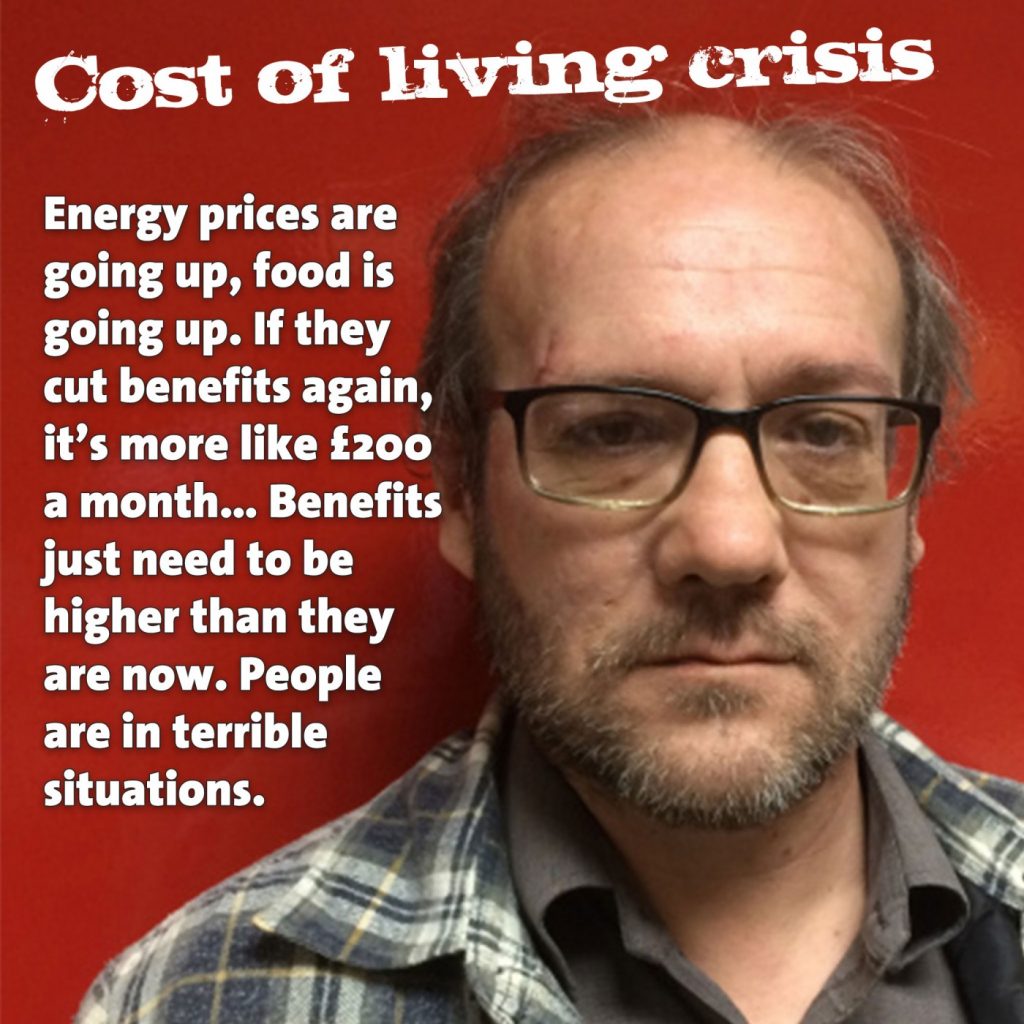What does the cost of living crisis mean for people in poverty?
Martin can see the rise in the cost of living, every time he looks at his energy meter. So what does the cost of living crisis mean for people in poverty?

Martin’s bills have already increased once, and he now faces being charged about £1.50 a day more than a year ago. £1.50 a day. That’s £10.50 a week, £45 a month, £547 a year.
“I notice it all the time, and it will go up again in April. It’s very difficult at the moment,” he says. “Very, very difficult.”
Martin lives in Halifax in West Yorkshire, sometimes on his own and sometimes with his son in the house.
He used to be a forklift truck driver, but had to stop working when he suffered nerve damage, and he has long-lasting pain and anxiety.
He has deep first-hand knowledge of living in poverty in the UK, and has been involved in many grassroots campaigns and projects, working to challenge and change unjust systems that trap people in poverty. He knows what helps or hinders people in his situation. Cutting benefits, needless to say, would be immensely unhelpful and severely damaging.
“Take the Universal Credit uplift,” he says. “That extra £20 a week we were getting was really helping – but then that got taken away last autumn and it put me right back down again. It’s very hard now. That £20 a week was about £80 a month and meant a lot. It meant I was not stressing so much and it meant I might have a little available if I needed to buy a new pair of shoes or something. Taking that away means I cannot do things, so then my mental health is worse, and I’m stuck indoors.
“I can’t turn my heating off because of my health. I need it on or it affects my mobility. If I’m warm, I can do a bit, but not if I’m cold. My anxiety and depression now is getting worse and worse again. I’m stressing all the time, and forever trying to change bill payment dates and things like that.”

That £20 a week was about £80 a month and meant a lot. It meant I was not stressing so much and it meant I might have a little available if I needed to buy a new pair of shoes or something. Taking that away means I cannot do things, so then my mental health is worse, and I’m stuck indoors.
———— Martin
The Government cut Universal Credit last October, pulling away one of the lifelines it had put in place to help people stay afloat during the pandemic.
Four months on, rising bills and inflation are making the storm even worse. The solution should be clear. Government ought to be ensuring benefits rise in line with the costs of living. Instead, people on benefits face a second cut in the space of a few months. Inflation is set to reach 7% by April, but benefits are set to rise by only 3.1%. That means anyone who was just balancing their budget last year, will now face a significant shortfall. Anyone already short faces being swept into poverty.
“It’s not just the £80 a month they’ve taken away in Universal Credit,” says Martin. “Energy prices are going up, food is going up. If they cut benefits again, it’s more like £200 a month.”
It’s a similar situation all over the country.
In Portsmouth, North End Baptist Church runs a Your Local Pantry store. The community initiative brings people together around food, forging new relationships and helping people save on their grocery shopping. That final point is a key attraction right now.
Jo Green, one of the Pantry managers, says: “We are getting busier and busier, unsurprisingly. We’ve just had our busiest ever week, with 110 people, and we are getting a lot of new people signing up. We have close to 600 members now.
“Most people are coming weekly, and they are saying they’re petrified to put the heating on, and are trying to do things like more batch cooking to not use as much gas. Some people come here because they are mindful of food waste, and some because they have less money than before to spend on food. Some people are saying their diet has had to change. If people are working part time, they might have enough for bills but not for food. A couple of people here are retired and say their pension doesn’t cover the food they need.
“What’s the answer? There needs to be an overhaul of benefits. I know families with people on Universal Credit and changing circumstances takes too long to process, and people don’t have enough.”

There needs to be an overhaul of benefits. I know families with people on Universal Credit and changing circumstances takes too long to process, and people don’t have enough.
———— Jo Green, North End Pantry

Ness Brown, manager at the InterAct Pantry in Leeds (pictured on the right above), tells a similar story.
“People are so worried about fuel bills,” she says. “Many have already had one increase, and April’s will be the second. The other issue round here is that one of the budget shops in the community is closing, and the shopping area is becoming a bit gentrified. It’s harder for people to access affordable food. We do what we can, but what I worry about is getting to the point when we might have to turn people away because we’re at capacity.”
What needs to change?
There are many things Government could do to loosen the grip of poverty in the UK, but fundamentally, it must ensure that all households have enough to live on.
In the medium to long term, that means a sensible redesign of our whole social welfare system, based on evidence from people who understand the system first-hand. In the short term, it means ensuring benefits rise in parallel with rising living costs. Anything else is a cut in real terms, just months after last October’s Universal Credit cut. The Joseph Rowntree Foundation has calculated that 400,000 people could be swept into poverty if the Government does not alter its plans, and 9 million low-income households will be £500 a year worse off.
Peter Matejic, JRF’s deputy director of evidence and impact, says: “At a time when the case for support could not be clearer, the Government is choosing to further erode the value of benefits that are already wholly inadequate.”
The 7% figure is well-founded. It is the forecast in the Bank of England’s February 2022 Monetary Policy Report.
Social security is already woefully inadequate in the UK, stripped to the bone by years of cuts and freezes. Another cut would devastate households like Martin’s. It would be catastrophic and should be unthinkable. As Martin says:
“Benefits just need to be higher than they are now. People are in terrible situations.”

Be part of a movement that’s reclaiming dignity, agency and power

Comments (01)
Comments are closed.